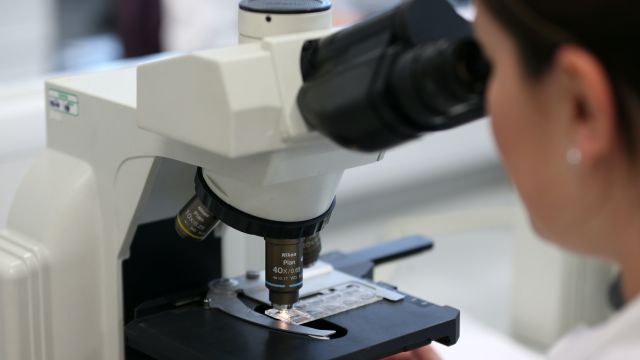The variants have already been linked to female breast cancer, but researchers say they found these genetic changes to have a greater effect on the risk of the disease in men than in women.
The scientists say their findings, published in the Journal of the National Cancer Institute, suggest breast cancer has similar genetic basis in both men and women – and could lead to better risk testing for male cancer as well as development of new preventive drugs for those at high risk of the disease.
Lead author Dr Nick Orr, who led the research at The Institute of Cancer Research, London, said: “There has been much debate about whether breast cancers in women and men are distinct from one another.
“Our study has shown, for the first time, that the genetic factors influencing susceptibility to male breast cancer and the most common type of female breast cancer are much more alike than they are different.
Our findings suggest that the underlying biology that affects how breast cancer develops and grows are probably similar in men and women
“Our findings suggest that the underlying biology that affects how breast cancer develops and grows are probably similar in men and women.
“This means that advances in prevention and treatment for the disease may be of benefit to all patients, irrespective of their gender.”
The exact cause of breast cancer in men is not known, but there are some things that increase the risk of getting the disease, such as inheriting faulty versions of genes called BRCA1 or BRCA2 or conditions that can increase the level of oestrogen in the body.
Breast cancer is rare in men – there are about 350 men diagnosed each year in the UK, compared to around 55,000 cases in women.
The research, which was funded in part by Breast Cancer Now, involved scientists from The Institute of Cancer Research and Queen’s University Belfast.
The team analysed data from 1,380 men with breast cancer in what is thought to be the largest genetic study of male breast cancer to date.
They compared the genomes, or the genetic material, of these men, to 3,620 men without the disease.
This study, which shows more of a similarity between the genetic causes of the disease in men and women than previously thought, is a major step forward
The scientists found three genetic changes, called rs9371545, rs554219 and rs78540526, was associated with increased risk of male breast cancer by 47%, 45% and 61% respectively.
In addition, the study showed men at the greatest genetic risk were almost four times more likely to develop breast cancer than those at lowest risk.
The researchers said they also found a “strong correlation” between the genetic risk factors of male and female breast cancer, with 20% of the changes that influence the risk of breast cancer in women also having a similar effect on male breast cancer risk.
Dr Simon Vincent, director of research, services and influencing at Breast Cancer Now, said: “This study, which shows more of a similarity between the genetic causes of the disease in men and women than previously thought, is a major step forward.
“Our knowledge of breast cancer in men is limited, because male breast cancer is rare which makes it difficult to collect enough tissue or blood samples to research and understand the disease.
He added: “We now look forward to further research into the shared genetic causes of male breast cancer which could lead to developing risk reducing treatments and interventions to help prevent more cases among those at increased risk in the future.”







